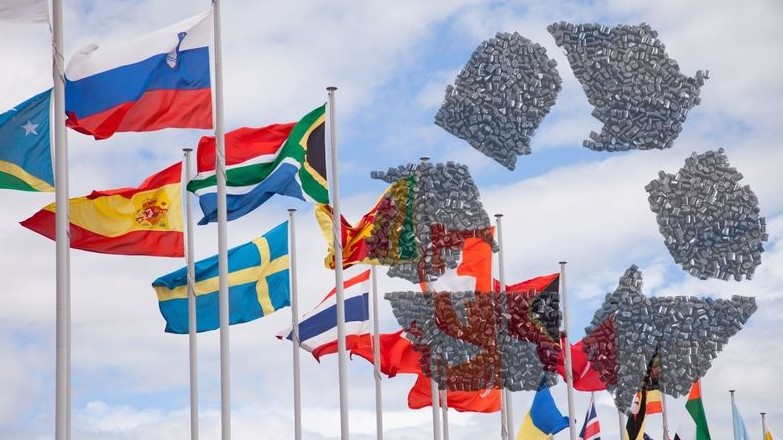To ‘make recycling work,' can plastics treaty fix ‘artificially low' v…
main text
To ‘make recycling work,' can plastics treaty fix ‘artificially low' virgin prices?

Graphic by Canva
As the plastics treaty talks head to potentially their final negotiations in August, large packaging firms are warning that the agreement could struggle to succeed if it can't fix the economic challenges recycled materials face against low-cost virgin plastic.
Firms like Amcor Ltd., one of world's largest plastics packaging makers, and Danish PET packaging producer Faerch A/S, for example, are arguing that the treaty needs to steer toward measures like targets for recycled content and extended producer responsibility regulations.
It's not a new position in the talks for some in the industry. Groups like the Business Coalition for a Global Plastics Treaty have supported the treaty including recycled-content requirements and EPR, which makes companies that use packaging pay fees to support recycling.
But the plastics packaging companies are putting an emphasis on those measures in public comments they're making ahead of the next round of talks, which run Aug. 5-14 in Geneva, Switzerland.
Geneva could the last negotiating session, after what was supposed to have been the final round in Busan, South Korea in December ended without an agreement.
In a July 15 webinar organized by the World Plastics Council and the Financial Times, David Clark, vice president of sustainability at Amcor, said the treaty needs to provide more policy frameworks to support greener packaging.

Clark
"What we've learned over the years is fundamentally, it costs more to collect and recycle material than in many cases it takes to make virgin material," he said. "We need a regulatory framework and funding, whether that's through producer responsibility or mechanisms like recycled content mandates, to provide the industry support that's needed to make recycling work."
He said difficulties that companies have had hitting voluntary targets around plastics recycling, like those set by plastics pacts worldwide, are pushing some in industry to see the treaty as one way to give an economic boost toward greener packaging.
"That's one of the reasons we've seen Amcor's customers and others, the brands, not being able to achieve the targets that they set for themselves in 2025 and why they're now looking for the UN treaty and other regulation to help provide the tailwinds and support that are needed to transition to the circular economy," Clark said.
Similarly, Elisabet Sandnes, vice president and chief sustainability officer for PET packaging maker Faerch, said her company wants the treaty to address the cost advantages virgin resin production has, by boosting regulations like recycled-content targets.
"One of the things that has created obviously some speed bumps in terms of getting our recycled products out is that virgin plastic prices are trading at lower prices," she said. "Policy making around leveling the playing field so that recyclers can compete fairly with virgin resin producers is something we're hoping to see."
Sandnes argued that the prices of virgin plastic don't internalize the pollution or resource costs of manufacturing it, putting recycled resins at an economic disadvantage.
"What we're seeing today is that virgin plastics is selling at artificially low prices because basically they don't reflect the full cost of carbon, energy or resource depletion, and as long as that is not priced in, recycled content will always be more expensive," she said.
Sandness said that 62 percent of the carbon footprint of Faerch's products comes from raw materials, meaning that using recycled content is a key for the company to reduce the environmental impact of its products.

Sandnes
"Collaborating closely with our customers is the main lever that we can pull in order to decarbonize our footprint but also decarbonize, together with our customers, their footprint," she said. "Basically, inserting more recycled content and designing food packaging that is recyclable is key for us to reach our goals."
Faerch makes PET food trays and other products and has 5,600 employees in more than 20 factories worldwide.
Clark said it can be a tough economic sell to get customers to use more recycled content. A regulatory framework supported by the treaty can provide economic support for greener packaging, he said.
"In a time when consumers are looking for value and brands are struggling to deliver that value, it's really hard to convince them to use recycled materials if their competitors are not doing it," he said. "It's fundamental that we get some type of regulatory support that stabilizes that demand and makes the whole circular system viable and sustainable, not just from an environmental standpoint, but from an economic standpoint too."
* Edit : HANDLER
- PreviousIndia imposes anti-dumping duties on Chinese, Taiwanese presses 25.07.20
- NextWoojin Plaimm Newsletter, July 2025, Vol.27 25.07.18
